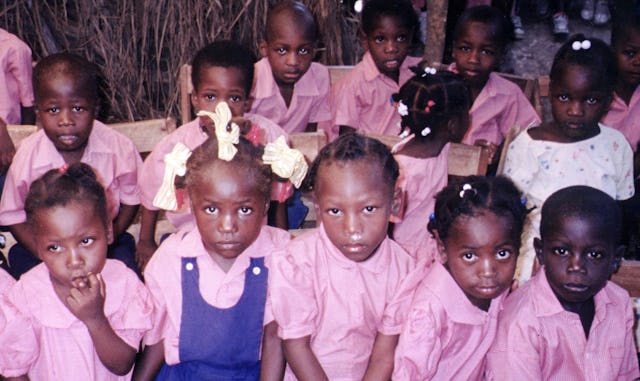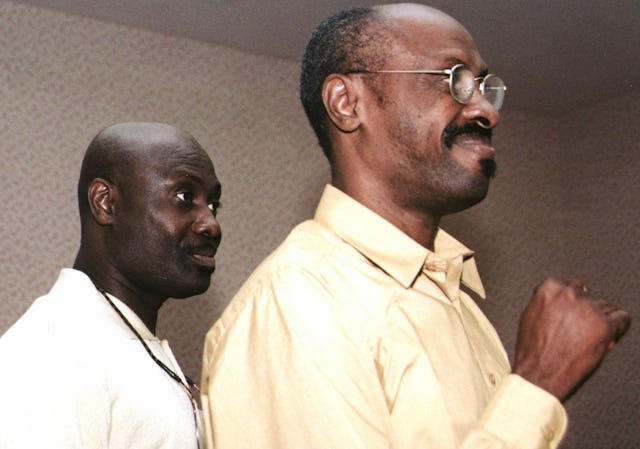Colored ribbons, a gold mine and a path to peace
ORLANDO, FL, United States — Some have colored ribbons in their hair, most are in pink uniforms and all look with solemn wonder at the camera held by a man from a far off land.
These pupils of a new school in Haiti present an endearing sight in one of the photographs David Smith spreads before him.
It was images like this that helped Mr. Smith and his colleagues tell the story of a project in the village of Pichon in Haiti where education is being brought to a community deprived of many basics of modern life.
He and his co-presenters described the project at the Baha'i Conference on Social and Economic Development for the Americas, held in Orlando, Florida, 19-22 December 2002. His co-presenters (and partners in this work) were Haitians and fellow-Baha'is Pierre Balthazar and his brother Loulou.
These three work in collaboration with a growing network of family, neighbors and friends in Haiti and in Michigan in the United States.
"In a sense we are building community on both sides of this equation," said Mr. Smith, the managing director of a federal grant administered by the Michigan Department of Education Office of Special Education. He attends to his development work as a private project.
"It is a partnership in which everyone benefits."
Those involved have raised up and are developing in a staged process Ekole Panou ("Our School"), which now serves 125 pre-school and second grade pupils.
This Baha'i-inspired project is not only a demonstration of putting into practice the concept of the oneness of humanity but it also speaks of religious unity, with generous donations coming from Presbyterian, Catholic and other churches around Lansing, Michigan.
The Orlando conference, attended by 700 people from 36 countries as far apart as Australia and Kazakhstan, was sponsored by the Rabbani Charitable Trust, a Baha'i-inspired non-profit development funding organization.
Participants heard many other stories of successful endeavors by Baha'is to use spiritual principles as a foundation for practical assistance in social and economic development.
For example, Luis Henrique Beust outlined to delegates how Baha'is have trained judges and prosecutors in Brazil about the relationship between human values and their daily responsibilities.
"Those being trained welcomed this synergy as a new way of envisioning their role in the world," said Mr. Beust, a member of the national governing council of the Baha'i community of Brazil.
William Davis, a member of the equivalent body in the United States, described a World Bank initiative in which he took part to mediate a dispute over gold mining in the mountains of Peru.
The key, said Mr. Davis, was to build social capital -- how people cooperate for common ends on the basis of common norms and values -- and its principal byproduct, trust.
It was with practical illustrations such as these, that experienced development practitioners shared their experience with newcomers to the field.
There were workshops on such topics as mentoring physicians-in-training, preventing domestic violence, care of the soul for effective leadership, and young women's development.
One of the key lessons was that the development process is an on-going process of learning, a feedback loop between participants and practitioners, whereby the entire community obtains the knowledge needed for advancement.
"Baha'i social and economic development is really all about learning and taking some steps and learning from them," said Canadian Gordon Naylor.
Mr. Naylor, a member of the national governing council of the Baha'is of Canada and a development practitioner himself, spoke about the need for spiritual and material progress to go hand in hand.
"The world has the technology, knowledge and resources to change conditions," he said. "What it lacks is the will that religious belief provides."
"You can't motivate people when you don't involve their beliefs," he said. "Religion moves the hearts of people. It causes them to sacrifice."
"Religion must be accepted not merely as a vehicle for the delivery of services but as a full partner in formulating a vision and programs," he said.
Mr. Davis summed up the conference with observations about the role of the individual in "upraising the quality of human life, a goal which became the theme of the conference."
"Individual initiative was the starting point for change," he said.
"Applying the teachings of Baha'u'llah, the Prophet-Founder of the Baha'i Faith," said Mr. Davis, " we stand at the threshold of trying to build a new culture that is neither East nor West."
"Everyone has the right and responsibility to contribute to this enterprise."

